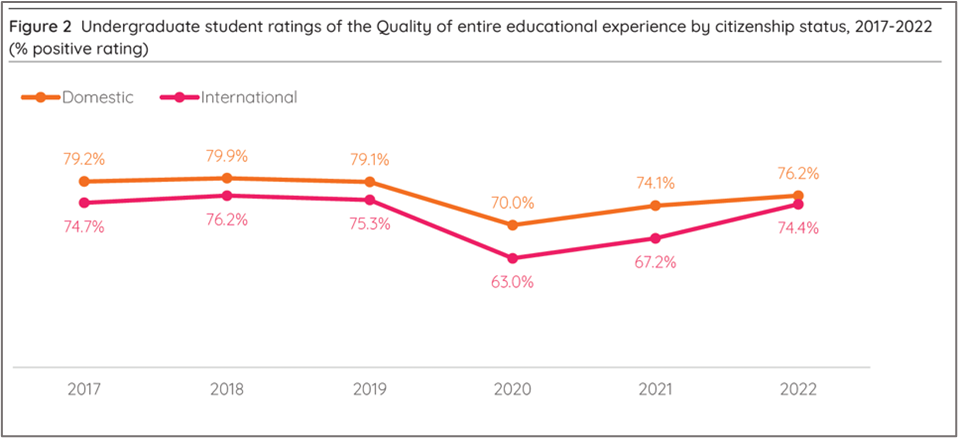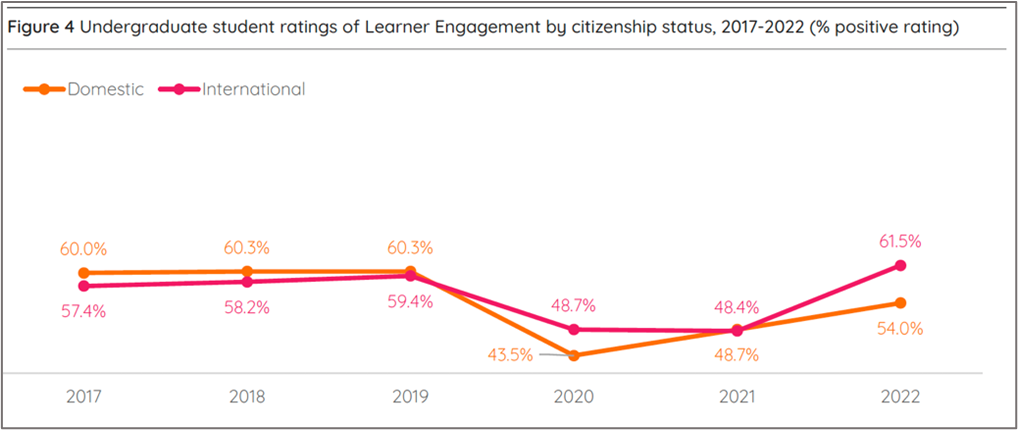The 2022 QILT Student Experience Survey results garnered public attention last week, with a number of media outlets focussing on the relatively poor performance of some of Australia’s most highly regarded universities compared to smaller private universities and non-university higher education institutions.
Relatively less attention focused on the experiences of Australia’s international students, but they should not be overlooked.
Australia’s higher education institutions have collectively done a very good job in improving the educational experiences of international students post-pandemic.
While many domestic and international students reported a decline in their educational experience during the pandemic, the rate of decline was highest for international students (many of whom were studying offshore). And while institutions need to continue to lift the quality of the post-pandemic student experience for domestic and international students – it is pleasing to see the gap between domestic and international students has narrowed.

And on the measure of ‘learner engagement’, international students now rate their experiences more highly than domestic students.

Students from India (77.8%) and Nepal (76.1%) had the highest ratings for the quality of their entire educational experience (above the average of 74.4%), with students from China just below the average at 74.1%.
The universities rated highest by international students for the quality of their educational experience were:
- Avondale University (92.0%)
- Bond University (83.5%)
- Central Queensland University (82.4%)
- James Cook University (81.2%) and the University of Western Australia (81.2%), and
- the University of Southern Queensland (80.7%).
Those with the lowest ratings were:
- the University of Sydney (62.2%)
- the University of New England (65.3%)
- the University of Melbourne (69.1%)
- the University of Tasmania (69.5%), and
- Monash University (69.6%).
The non-university higher education providers[1] receiving the highest ratings by international students were:
- Leaders Institute (100%) and Australian College of Theology (100%)
- Sheridan College (94.8%)
- Alphacrucis College (89.4%)
- TAFE Queensland (87.9%), and
- International College of Hotel Management (85.7%).
Those with the lowest ratings were:
- Academy of Information Technology (56.1%)
- Endeavour College of Natural Health (58.8%)
- Australian College of Applied Professions (60.6%)
- Le Cordon Bleu Australia (61.7%), and
- Eynesbury College (66.7%).
The challenge for institutions that rated poorly is to learn from the best-performing institutions – and all institutions should focus on continuing to narrow the gap in experience between international and domestic students.
[1] Due to much smaller student numbers and, therefore, sample sizes, the QILT survey responses for non-university higher education providers are aggregated across two years (2021-22) and therefore cannot be compared with university results – which are for 2022 only.


















